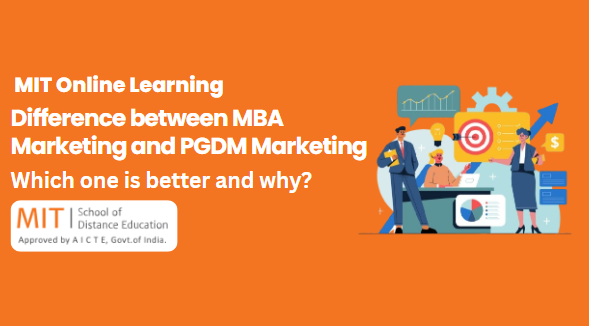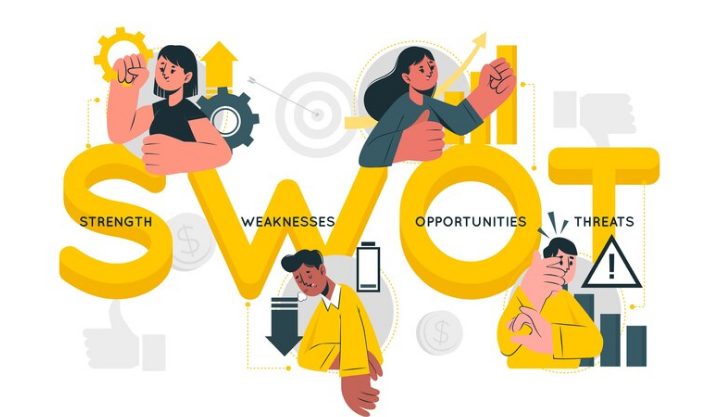
Marketing has emerged as the key to business success in a world where digital innovation and shifting customer behavior are the driving forces. Today, connecting, persuading, and providing value are more important than merely selling. Professionals in this field require certain knowledge and strategic abilities to succeed.
Aspiring marketers often find themselves caught in a classic debate — MBA in Marketing or PGDM in Marketing? Both paths can lead to high-growth careers, but they cater to different learning styles and professional goals.
Let’s break down the differences and help you discover which route aligns best with your ambitions.
Understanding the Basics
🎓 What is an MBA in Marketing?
An MBA (Master of Business Administration) in Marketing is a university-affiliated postgraduate degree. It builds a strong foundation in business management with a focus on marketing disciplines. Structured within a rigid academic framework, it emphasizes analytical thinking, theoretical knowledge, and business strategy.
Ideal for students who seek a well-rounded business education and value the credibility of a recognized university degree.
📈 What is a PGDM in Marketing?

A PGDM (Post Graduate Diploma in Management) in Marketing is offered by AICTE-approved autonomous institutions. Unlike the traditional MBA, PGDM programs are industry-driven, flexible, and practice-oriented. These courses adapt quickly to new marketing trends, from influencer marketing to AI-powered consumer insights.
A great choice for those who want hands-on training and real-time exposure to marketing challenges.
Core Differences at a Glance
Category | MBA in Marketing | PGDM in Marketing |
Qualification | Degree (University) | Diploma (Autonomous Institute) |
Recognition | UGC/University-Approved | AICTE-Approved |
Curriculum Style | Academic & Research-Focused | Dynamic & Industry-Aligned |
Learning Approach | Theoretical | Practical with Live Projects |
Flexibility | Limited | High (Online, Distance, Modular Options) |
Faculty | Academicians | Industry Professionals |
Program Duration | 2 Years | 1–2 Years |
Target Audience | Fresh Graduates | Graduates & Working Professionals |
Average Fees | ₹3 – ₹20 Lakhs | ₹2.5 – ₹10 Lakhs |
Who Can Apply?
✅ MBA in Marketing
- Bachelor’s degree from a recognized university
- National-level entrance tests: CAT, XAT, CMAT, etc.
- GD-PI rounds in most institutes
- Preferable (not mandatory): work experience
✅ PGDM in Marketing
- Graduate with 50% marks
- Accepted entrance tests: CAT, MAT, ATMA, etc.
- Some programs require prior work experience
- Ideal for freshers and mid-career professionals
What Will You Learn?
📚 MBA in Marketing: Academic & Strategic Emphasis
- Principles of Marketing
- Sales & Distribution
- Consumer Behavior
- Business Communication
- Strategic Management
- Advertising & Branding
- Optional Digital Marketing modules
Focuses more on academic rigor and theoretical frameworks — useful for consulting or research-based roles.
🔍 PGDM in Marketing: Practical, Digital & Trend-Focused
- Strategic Marketing Management
- Digital & Social Media Marketing
- Services & Retail Marketing
- Marketing Analytics
- CRM & Marketing Automation
- Global & Rural Marketing
- Live Marketing Projects
Courses are regularly updated to reflect emerging trends and tools, offering real-world marketing problem-solving exposure.
Key Benefits: Which One Delivers More?
🏆 MBA in Marketing
- Recognized degree across the government and corporate sectors
- Strong theoretical foundation
- Greater alumni network (especially from legacy universities)
- Brand recognition if pursued from top institutes
🚀 PGDM in Marketing
- Curriculum tailored to current market demands
- Greater exposure to real-time business challenges
- Skill-based and digitally enriched modules
- High adaptability for evolving marketing roles
- Delivered by marketing experts and practitioners
Cost Comparison 💰
While both programs vary in cost depending on the institution, here’s a general breakdown:
MBA in Marketing: ₹3 to ₹20 lakhs
(Higher for IIMs and premium private universities)
PGDM in Marketing: ₹2.5 to ₹10 lakhs
(Flexible online/distance options available with EMIs and scholarships)
Why PGDM in Marketing Often Comes Out on Top
Though both options can help launch or elevate your marketing career, PGDM programs edge ahead in certain areas:
✅ Curriculum is responsive to industry needs
✅ Focus on skills over theory
✅ Strong internship and capstone project components
✅ More networking with marketing professionals
✅ Suitable for upskilling while working
If your aim is to thrive in fast-paced marketing environments — digital agencies, branding firms, multinational campaigns — a PGDM provides direct entry into modern marketing ecosystems.
Choose MITSDE’s PGDM in Marketing Management 🎯
If you’re leaning toward a future-ready program, look no further than MITSDE (MIT School of Distance Education). It’s among India’s top institutions offering an industry-aligned, flexible PGDM in Marketing.

🌟 What Makes MITSDE Stand Out?
- 100% online delivery with flexible learning
- Designed by marketing leaders and faculty from top B-schools
- Modules in SEO, Paid Media, CRM, Email Marketing, and more
- Practical exposure through case studies, tools training, and simulations
- Mentoring, placement support, and career guidance
Whether you’re a graduate entering the marketing world or a professional aiming to reskill, MITSDE prepares you to lead.
Final Take: Which Program Should You Pick?
✔️ Choose an MBA in Marketing if:
- You want a degree with university recognition
- You’re interested in a traditional academic approach
- You plan to move into consulting, academia, or core business management
✔️ Choose PGDM in Marketing if:
- You seek a fast-track, skill-based marketing program
- You value practical learning, digital tools, and live exposure
- You want to upskill while working or pivot careers
Ready to Power Your Marketing Career? 🚀
If innovation, practical skills, and strategic thinking are your goals — the PGDM in Marketing Management at MITSDE is your answer.
👉 Explore the MITSDE PGDM Marketing Program

